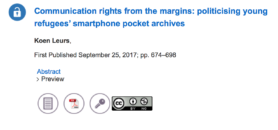Publications
Article published: Communication rights from the margins: politicising young refugees’ smartphone pocket archives
The journal special issue on Postnormative Cosmopolitanism: Voice, Space and Politics, guest-edited by Miyase Christensen, has been published in the International Communication Gazette. I’m honoured to announce the issue includes an article I wrote on the smartphone pocket archives of young people of forced migration background in the Netherlands. I conceptualise these archives from the perspective of communication rights.

Communication rights from the margins: politicising young refugees’ smartphone pocket archives
Abstract:
Politicising the smartphone pocket archives and experiences of 16 young refugees living in the Netherlands, this explorative study re-conceptualises and empirically grounds communication rights. The focus is on the usage of social media among young refugees, who operate from the margins of society, human rights discourse and technology. I focus on digital performativity as a means to address unjust communicative power relations and human right violations. Methodologically, I draw on empirical data gathered through a mixed-methods, participatory action fieldwork research approach. The empirical section details how digital practices may invoke human right ideals including the human right to self-determination, the right to self-expression, the right to information, the right to family life and the right to cultural identity. The digital performativity of communication rights becomes meaningful when fundamentally situated within hierarchical and intersectional power relations of gender, race, nationality among others, and as inherently related to material conditions and other basic human rights including access to shelter, food, well-being and education.
Abstract:
Politicising the smartphone pocket archives and experiences of 16 young refugees living in the Netherlands, this explorative study re-conceptualises and empirically grounds communication rights. The focus is on the usage of social media among young refugees, who operate from the margins of society, human rights discourse and technology. I focus on digital performativity as a means to address unjust communicative power relations and human right violations. Methodologically, I draw on empirical data gathered through a mixed-methods, participatory action fieldwork research approach. The empirical section details how digital practices may invoke human right ideals including the human right to self-determination, the right to self-expression, the right to information, the right to family life and the right to cultural identity. The digital performativity of communication rights becomes meaningful when fundamentally situated within hierarchical and intersectional power relations of gender, race, nationality among others, and as inherently related to material conditions and other basic human rights including access to shelter, food, well-being and education.
The article is published open-access and can be downloaded here.

